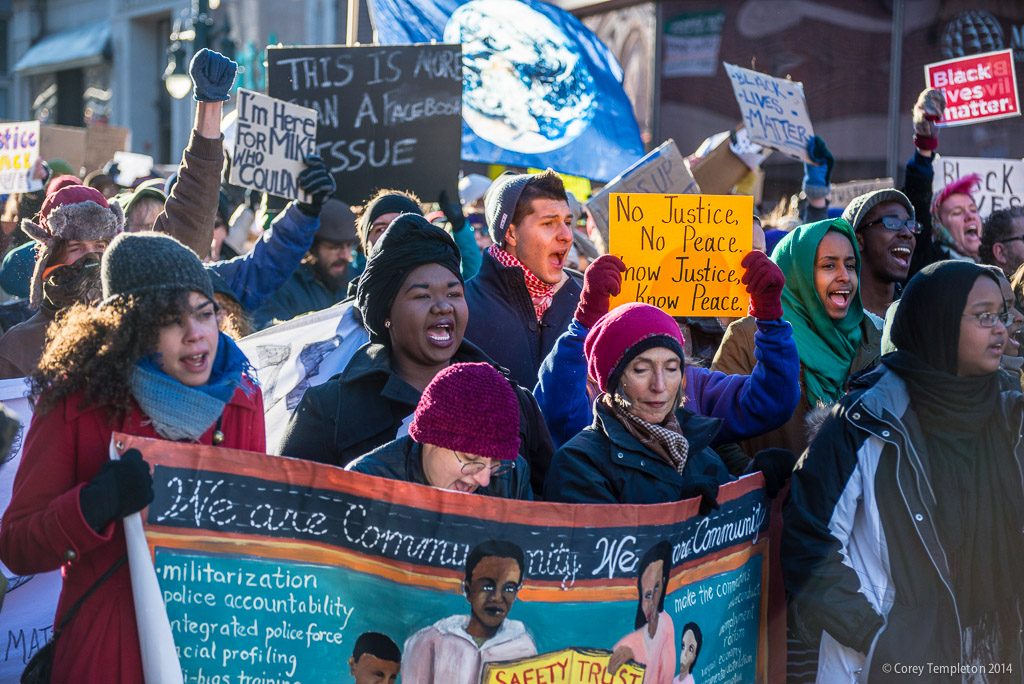Photo credit: Corey Templeton via flickr
The editorial team of the Peace Science Digest (referred to as “we” in remainder of this statement) is appalled by continued incidents of racist police violence in the United States. We unequivocally support the Black Lives Matter movement. Centuries of abhorrent and unjust treatment of Black people continues today due to deep-rooted beliefs in white supremacy, which is ingrained and replicated in our institutions and everyday lives. We are compelled in this moment to do more to address the deep roots of racism and white supremacy present in our own work, which have largely remained unexplored.
Reflecting on our role as peace scholars and practitioners, we realize that our work has focused too narrowly on conflict dynamics and violence prevention abroad and has failed to adequately address those same dynamics in our communities at home. This is a blind spot and one that we seek to immediately address in the coming months. With our attention trained on war prevention, we have been too quick to fall into a facile war/peace distinction that has hidden from view the continuum of violence and insecurity regularly experienced by Black, Indigenous, and other People of Color (BIPOC) here in our own society. No society that allows violence and oppression to continue unmitigated can rightly be assumed to be “peaceful.” We therefore re-commit ourselves to examining direct and structural violence wherever they may appear, whether in the U.S. or abroad, as well as the connections between these different forms of violence and their domestic and global manifestations.
Following the leadership of Women of Color Advancing Peace and Security (WCAPS) and their statement on “Standing Together Against Racism and Discrimination,” we pledge to “root out institutional racism by re-examining our implicit and explicit biases, as well as biases within our own organizations.” To that we end, we commit to:
- Hiring an external consultant to help (1) facilitate a team reflection on our implicit/explicit biases and (2) develop a diversity, equity, and inclusion (DEI) framework for the Peace Science Digest. While our team has committed to educating ourselves on white supremacy and racism, we are still learning and want to make sure we apply this knowledge to our work in a meaningful and intentional way. We believe that bringing in an external consultant and following the leadership of BIPOC activists can help us acknowledge biases that have remained uninvestigated in our work.
- Publishing more work from BIPOC scholars in peace and conflict studies, political science, international relations, sociology, anthropology, social psychology, and other related fields. In the past year, we have made a similar commitment to achieve gender equity in the analyses we publish and believe that same commitment should be extended to racial parity. Part of this work will include an audit of our previous published analyses to examine demographic trends in the authorship of the research we highlight. We commit to publishing those insights as a sign of transparency and to the benefit of our field to better support diversity in research.
- Publishing on a broader range of topics that explore the intersections of racism, white supremacy, and racial justice movements with peace and security. Reflecting on our previous decision-making processes on the research we feature in the Digest, we have shied away from research on topics like U.S. politics or policing, believing it to be outside our analytical purview. With new direction from the War Prevention Initiative aimed at transforming the global peace and security paradigm, we are embracing a dual analytical focus on demilitarizing security and managing political conflict without violence. Through our analyses we will contribute to advancing (1) a radically transformed concept of security that prioritizes a global, shared security paradigm cognizant of the lived experience(s) of individuals and communities, particularly those made more vulnerable by security threats or whose voices are often overlooked by traditional security discourse and (2) knowledge about the effectiveness of nonviolence as a tool to constructively wage conflict, mitigate ongoing violence, and transform conflict towards a just peace. Both areas of focus provide clear openings for investigating alternatives to armed policing and effective resistance strategies for racial justice, among other topics.
We cannot ignore the demographics of our professional field of peace and security. We support the efforts of WCAPS, as noted in their statement, to “change the face of international peace and security by ensuring that our organizations reflect the diversity of America and at all levels.” We plan to support this effort by:
- Examining our partnerships and actively seeking partnerships with BIPOC individuals and BIPOC-led organizations.
- Expanding our professional network and regular engagement with BIPOC individuals and BIPOC-led organizations.
- Seeking participation from BIPOC individuals on a Board of Advisors for the Peace Science Digest.
We understand that these are the first steps of long and sustained work to dismantle white supremacy and racism in our work. As a predominately white team, we acknowledge that we will make mistakes in our efforts to combat racism. We pledge to remain open to criticism and redirection from those willing to speak about what we’ve gotten wrong.
Thank you for your continued readership and support of the Peace Science Digest.

